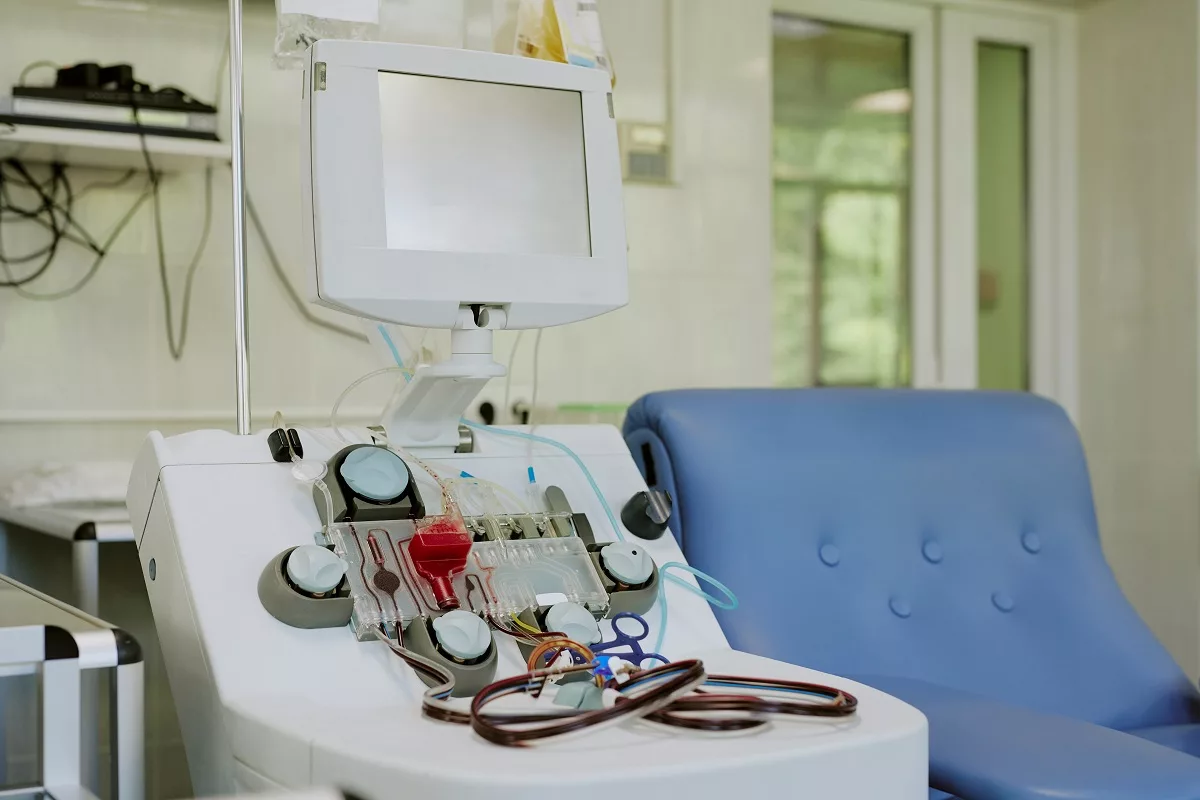A condition in which a buildup of waste products occurs in the blood is called uremia. Commonly, it occurs due to an untreated kidney failure. Those who develop this disorder usually experience the following symptoms. For example, nausea, vomiting, tiredness, and others. Doctors often recommend dialysis and kidney transplant surgery. If it is left untreated, it may lead to death.
In normal circumstances, the kidneys filter waste, toxins, and excess fluids from the blood. Thus, these waste products leave the body through the urine. Moreover, it helps maintain healthy levels of certain acids, such as electrolytes and hormones, including vitamin D and erythropoietin (EPO). However, when the kidneys are damaged, they cannot filter blood properly, which may lead to a buildup of toxins and waste in the body.
In most cases, this disorder develops due to kidney failure caused by chronic kidney disease (CKD) or end-stage renal disease (ESKD). While most people develop a mild form of ESKD, some of them may have a severe form that usually leads to sudden kidney injury and failure.
While there are 5 stages of chronic kidney disease, people usually develop uremia when the condition advances to the IV stage.
In general, uremia occurs quite rarely, especially if you are under the care of a healthcare professional specialized in diagnosing and treating kidney disorders (also known as nephrologists).
Symptoms
The primary symptoms of this condition are nausea and vomiting. However, people with uremia may also experience other symptoms. For example:
- Unusual weight loss
- Cognitive dysfunction (problems with remembering and thinking)
- Fatigue (extreme tiredness)
- Dyspnea (shortness of breath)
- Metallic taste in the mouth
- Muscle cramps or pain
- Itching
- Pericarditis (inflammation of the heart’s lining)
- Uremic frost (yellow-white crystals that appear on the skin after sweating)
- Breath smelling like pee (also called uremic fetor)
- Seizures
- Coma (in severe cases)
If you notice any of the previous symptoms, contact your doctor right away.
Causes
The most common cause of uremia is kidney failure caused by chronic kidney disease. However, any health condition that causes CKD may cause kidney failure and then uremia. Moreover, hypertension (high blood pressure) and diabetes are the most common causes of CKD, but it may occur due to other diseases as well.
In addition, some people with kidney failure are not able to begin dialysis, which makes it impossible to know whether they have CKD and seek care to prevent kidney failure.
However, if you have chronic kidney disease, especially with an estimated glomerular filtration rate below 45, you should get immediate treatment. While not every time CKD progresses to kidney failure, it usually cannot be prevented. Thus, your nephrologist may help you understand your CKD and get the necessary care. Once kidney failure begins, the only ways to treat it are dialysis or a kidney transplant.
What Are The Possible Complications of Uremia?
People with uremia may also experience some complications. These include:
- Anemia (reduced red blood cell count)
- Excessive bleeding
- Skeletal problems
- Pericardial effusion (fluid buildup around the heart muscle)
- Inflammation of the heart tissue (pericarditis)
- Uremic encephalopathy (reduced brain function caused by toxin buildup)
- Restlessness
- Infertility
- Malnutrition (inability to get enough nutrients required for the body to function properly)
This document does not contain a complete list of complications. Furthermore, you can talk with your doctors about ways to prevent uremia complications.
How to Prevent Uremia?
While people with end-stage kidney disease should get regular dialysis to clear the blood of toxins and waste, those who suffer from CKD can prevent or delay kidney failure. Check below some examples:
- Manage chronic health conditions (including diabetes, hypertension, or others)
- Do not take drugs that may cause further damage to the kidneys, including nonsteroidal anti-inflammatory drugs (NSAIDs), prescription laxatives, and recreational drugs
- Avoid alcoholic drinks
- Adopt a healthy diet (including fresh fruits and vegetables)
- Regularly exercise – It is recommended to aim for at least 150 minutes of physical exercise per week
- Stop smoking – If you face problems with smoking cessation, it is advised to discuss it with your healthcare provider
Diagnosis
First, doctors will perform a physical examination to check kidney function, evaluate your medical history, and may also ask some questions about your symptoms. Thereafter, doctors may perform the following tests to determine how well your kidneys work. These include:
- Estimated glomerular filtration rate (eGFR) – It involves a serum creatinine test that is a part of most chemistry panels. It helps determine how well your kidneys work.
- Blood urea nitrogen (BUN) test – This is a type of blood test used to measure waste product urea nitrogen levels in the blood.
However, to confirm the condition, physicians usually perform an imaging test (kidney ultrasound). It helps identify kidney blockages, stones, or injuries and scarring.
Treatment
Commonly, people with uremia require dialysis. During this procedure, doctors will clean your blood of toxins and waste. In general, there are 2 types of dialysis. For example:
- Hemodialysis – This procedure uses a machine to filter the blood outside the body.
- Peritoneal dialysis – In such cases, it uses the lining of your stomach and a special fluid to filter the blood.
Usually, doctors recommend a kidney transplant if you have end-stage kidney failure. Additionally, doctors may prescribe some medicines. These medications cannot treat this condition, but they may lessen the effects caused by uremia. For example:
- Replacement EPO (used to prevent anemia)
- Iron supplements
- Calcium and vitamin D supplements
- Phosphate binders
- Antihypertensives
- Medicines to treat heart disease
Frequently Asked Questions
How long can a person live with uremia?
Usually, if you develop kidney failure that may lead to uremia, you can live a few days or weeks without dialysis or a kidney transplant. For those who choose not to begin dialysis, doctors may recommend treatments to reduce the symptoms (also called palliative care).
When should I go to the ER?
Call 911 or go to the nearest emergency room if you experience any of the following symptoms. Examples include:
- Abnormal behavior
- Confusion
- Drowsiness
- Fatigue (extreme tiredness)
- Breathing problems
- Difficulty focusing or concentrating
- Chest pain
When should I see a healthcare professional?
It is recommended to get regular checkups to monitor the kidneys if you are at increased risk of developing chronic kidney disease. For example:
- A family history of kidney disease
- Previous kidney injury
- Hypertension (high blood pressure)
- Swelling (edema)
- Misuse of NSAIDs
Ask your healthcare provider if you have additional questions.




